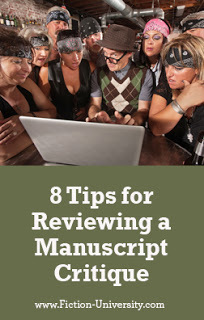Janice Hardy's Blog, page 104
June 23, 2018
Real Life Diagnostics: Does This Women’s Fiction Opening Work?
 Critique By Janice Hardy, @Janice_Hardy
Critique By Janice Hardy, @Janice_HardyReal Life Diagnostics is a weekly column that studies a snippet of a work in progress for specific issues. Readers are encouraged to send in work with questions, and we diagnose it on the site. It’s part critique, part example, and designed to help the submitter as well as anyone else having a similar problem.
If you're interested in submitting to Real Life Diagnostics, please check out these guidelines.
Submissions currently in the queue: Two
Please Note: As of today, RLD slots are booked through July 7.
This week’s question:
Does this opening work?
Market/Genre: Women’s Fiction
On to the diagnosis…
Read more »Written by Janice Hardy. Fiction-University.com

Published on June 23, 2018 03:00
June 22, 2018
Balancing Real Life with Writing Fiction
 By Patricia Caliskan, @Caliskaniverse_
By Patricia Caliskan, @Caliskaniverse_ Part of the How They Do It Series
JH: Balancing real life and writing is hard for almost everyone (even full-time authors like me). Patricia Caliskan returns to the lecture hall today to give us a few tips on how to juggle our busy writing lives.
Patricia Caliskan began her writing career as an entertainment journalist, before joining Trinity Mirror Newsgroup. She likes a nice, flouncy scarf, a good pair of boots, and laughter. Lots of laughter. Otherwise life feels far too grown-up for her liking.
Twitter | Goodreads | Amazon |
Take it away Patricia...
Read more »Written by Janice Hardy. Fiction-University.com

Published on June 22, 2018 03:00
June 21, 2018
Why a Serial Might Be a Good Move for Your Writing
 By J. Kathleen Cheney, @jkcheney
By J. Kathleen Cheney, @jkcheney Part of the Indie Authors Series
Most of us are aware that there’s a strong audience for serial fiction out there. It’s not new. Serial fiction was published in newspapers in the Victorian age, in magazines, and consumed regularly on radio and television. Any series that has a continuing story is, in essence, serial. And the written word serial is gaining ground these days. Some of those authors are famous, some brand new, some indie, some trad-published, and some hybrids. Essentially, authors across the board have jumped on this stage.
If you’ve seen any of the serial outlets, like Serial Box, Wattpad, and Tapas, then you know that there are a range of authors out there supplying this niche with ever new stories.
(Here’s a great article from Den of Geek about some of the best serials out there.)
Read more »Written by Janice Hardy. Fiction-University.com

Published on June 21, 2018 03:00
June 20, 2018
8 Tips for Reviewing a Manuscript Critique
 By Janice Hardy, @Janice_Hardy
By Janice Hardy, @Janice_HardyOn July 2, I’ll be opening up Janice Hardy’s Critique Connection again for those looking for critique groups or partners. So it seemed like a good time to review how to handle a critique.
When you get that critique back, it can be easy to just ignore what you don't like and only take in the good stuff. But the “bad stuff” is what you asked for, and that feedback provides the opportunities to make your manuscript even better. Here are some things to remember when receiving a critique:
1. Take every comment seriously.
Even if it seems out of left field or flat out wrong, someone thought that based on what you wrote. Consider why the critiquer said what they said and try to see the underlying problem, then decide if it's a comment that needs to be addressed or not.
Read more »Written by Janice Hardy. Fiction-University.com

Published on June 20, 2018 03:59
June 19, 2018
Writing Advice for Writers Just Starting Out
 By Jamie Ford, @jamieford
By Jamie Ford, @jamiefordPart of the How They Do It Series
JH: With so much writing advice out there (this site alone will have close to 3000 articles by the end of the year), it can be challenging for new writers to find advice on what to do and how to manage their writing. Jamie Ford visits the lecture hall today to share his tips for writers beginning their writing journey.
Jamie Ford is the great-grandson of Nevada mining pioneer, Min Chung, who emigrated from Kaiping, China to San Francisco in 1865, where he adopted the western name “Ford,” thus confusing countless generations.
His debut novel, Hotel on the Corner of Bitter and Sweet , spent two years on the New York Times bestseller list and went on to win the Asian/Pacific American Award for Literature, and has been optioned for film and stage. His second book, Songs of Willow Frost , was also a national bestseller. His work has been translated into 35 languages. (He’s still holding out for Klingon, because that’s when you know you’ve made it).
His latest novel, Love and Other Consolations Prizes is available in trade paperback today.
When not writing or daydreaming, he can be found tweeting and posting on Instagram.
Website | Goodreads | Facebook | Twitter | Pinterest | Instagram
Take it away Jamie...
Read more »Written by Janice Hardy. Fiction-University.com

Published on June 19, 2018 04:17
June 18, 2018
Plotter or Pantser, You Really Should Outline the Second Draft
 By Janice Hardy, @Janice_Hardy
By Janice Hardy, @Janice_Hardy This past weekend I was teaching at the SCBWI-FL summer conference, and in both all-day workshop intensives, me and my fellow presenters (Michael Stearns, Lisa Yee, and Kait Feldmann) talked about outlining.
Love it or hate it, outlining is a useful, and dare I say vital, aspect of writing.
Outlining is where the big-picture stuff happens. It allows you to see how your story unfolds on a conceptual level without getting bogged down in the details. It lets you know that you’re hitting all the right beats and constructing a novel that will read well and keep readers interested.
But you don’t have to do it on a first draft if you don’t like outlines. Plenty of writers (though surprisingly, only a few in my sessions this weekend—it’s usually a fairly even split between plotters and pantsers), find outlining constraining, and feel it saps their creativity and stifles their ability to let their stories grow organically.
Read more »Written by Janice Hardy. Fiction-University.com

Published on June 18, 2018 04:52
June 17, 2018
Real Life Diagnostics: Would You Keep Reading This Middle Grade Opening?
 Critique By Janice Hardy, @Janice_Hardy
Critique By Janice Hardy, @Janice_HardyReal Life Diagnostics is a weekly column that studies a snippet of a work in progress for specific issues. Readers are encouraged to send in work with questions, and we diagnose it on the site. It’s part critique, part example, and designed to help the submitter as well as anyone else having a similar problem.
If you're interested in submitting to Real Life Diagnostics, please check out these guidelines.
Submissions currently in the queue: Two
Please Note: As of today, RLD slots are booked through June 30.
This week’s questions:
1. Does it hook you enough to want to read on?
2. Does it give you enough background to give you a sense of why he’s so nervous?
3. Does the last sentence work if I don’t let the reader know the reasoning behind it immediately.
Market/Genre: Middle Grade
On to the diagnosis…
Read more »Written by Janice Hardy. Fiction-University.com

Published on June 17, 2018 05:37
June 14, 2018
Are You Good Enough? Evaluating Whether You're Really Ready to Self-Publish
 By Jordan McCollum, @JordanMcCollum
By Jordan McCollum, @JordanMcCollumPart of the Indie Authors Series
Dipping into the archives today with one of the very first indie author posts, for another look at determining if you're ready to self publish.
Before you click that Publish button for the first time—or every time—there is a second of sheer terror. Your heart rate shoots up. Your palms sweat. Every doubt from your entire writing journey assails your mind: am I ready to do this? Am I ready to send my story out into the world? Is it really good enough to share?
. . . Am I good enough?
If this sounds like you, take a deep breath. It's natural to feel this way in every publishing path—yes, even if you have the "validation" of trade publishing, you might still feel like a phony or a wannabe or a hack. The self-doubts can be even stronger when you've tried to pursue trade publishing without success. And we've all seen or at least heard about self-published first novels that are . . . abysmal, to put it kindly.
Read more »Written by Janice Hardy. Fiction-University.com

Published on June 14, 2018 05:37
June 13, 2018
Tips on Writing Scene and Chapter Transitions
 By Janice Hardy, @Janice_Hardy
By Janice Hardy, @Janice_Hardy Stories flow from word to word, sentence to sentence, scene to scene. If we’ve done our job well as writers, each one draws the reader to the next and pulls them through the story. If we’ve stumbled a bit, they hit rough patches and ugly spots that stop the story and might even make them out it down and walk away.
The story is important, but so is how we transition from one scene to the next. This hand off is what creates the smooth narrative flow and sense of a story unfolding, versus a bunch of scenes where stuff happens but it feels disconnected.
There are all kinds of transitions. Paragraph transitions. Scene transitions. Chapter transitions. They each play different roles, but at the core, they all have the same job—to keep readers reading .
Read more »Written by Janice Hardy. Fiction-University.com

Published on June 13, 2018 05:55
June 12, 2018
6 Secrets of Science Fiction and Fantasy World Building
 By Laurence MacNaughton, @LMacNaughton
By Laurence MacNaughton, @LMacNaughton Part of the How They Do It Series (Contributing Author)
How do you, as a writer, build a new world that fascinates your readers, draws them in, and makes them want to come back for more? If you write fantasy, science fiction, or horror, you need to do your world building the right way. Here’s how.
1. Research until you find the weirdness.
We've all heard that truth is stranger than fiction. You can use the weirder aspects of our own world to build a more interesting story world of your own.
Before I sat down to create the crystal magic in my Dru Jasper urban fantasy series, I researched real-life crystals. I went to lapidaries (rock shops) in the Rocky Mountains. I attended gem and mineral shows. And I visited metaphysical shops to talk to people who really believe in crystal healing.
Read more »Written by Janice Hardy. Fiction-University.com

Published on June 12, 2018 05:14



